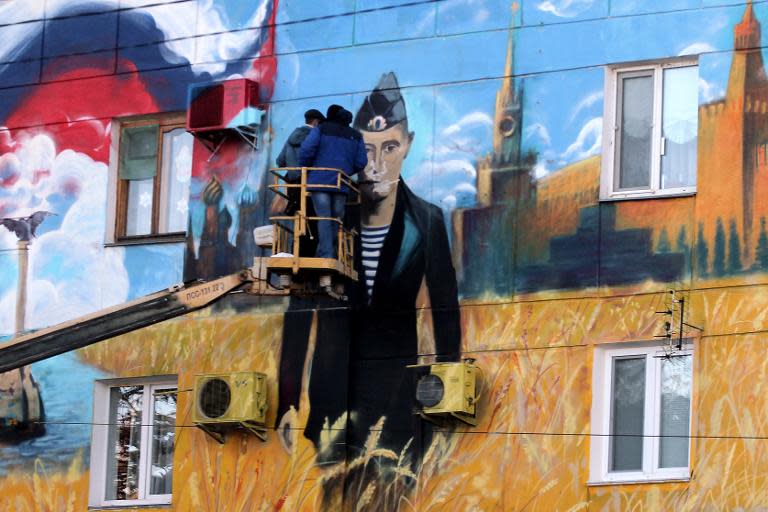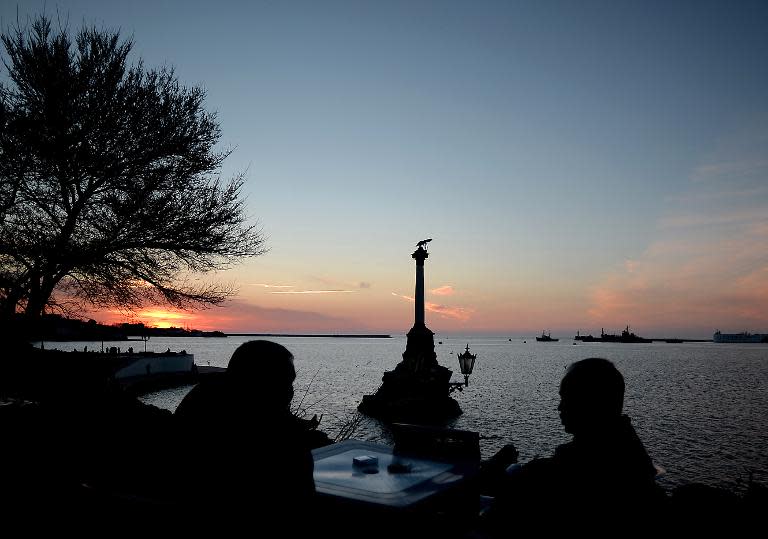Under Russia, isolated Crimea is twilight zone for business
Circling her thumb and index finger to make a zero, Tatyana Chernetskaya sums up how many clients her Crimean firm has one year after Russia took over the peninsula: "None." While many supporters of annexation of the Black Sea province from Ukraine expected to be better off under Moscow's rule, business in Crimea is strangled by economic isolation, Western sanctions, and local authorities nationalising key Ukrainian firms. Chernetskaya's firm, which produces accounting software, has had to fire most of the 55-strong staff, leaving just five. They lost over 3,000 clients in mainland Ukraine after telephone and banking communications were cut in the wake of Russia's annexation. And the few local clients were pressured by the new Russian authorities to dump her software and switch to a Russian-made programme. In the company's office, Ukrainian certificates still hang on walls and boxes packed with obsolete paperwork await disposal by the front door. She voted to join Russia in the referendum held in Crimea last March and has a portrait of Russian President Vladimir Putin hanging in her office. Her "very typical" hardships are the fault of corrupt local officials and "senseless" Western sanctions, not the Kremlin, she insists, even if she describes the transition to Russian tax and labour laws as overwhelming. "It's as if I fled as a refugee to a new country and have to start my life from scratch," she said. "There is a feeling that you are in some sort of nowhere-land. You've been left behind in that previous life, while here you have nothing." - Crimea under isolation - Many people on the peninsula who voted to join Russia last year were lured by the prospects of better economic opportunities. But Ukraine has cut most transport and communications links, while Western sanctions ban investment and restrict work of US and European companies. Visa and Mastercard do not work and it's difficult to exchange currency. All this scares even major Russian firms from operating in Crimea. The resulting economy is cash-based, with erratic supplies from Russia's southern Krasnodar region, with which Crimea shares an unreliable ferry link over the Kerch Strait. Shortages are manifest in thinly-stocked local supermarkets, where many shelves just have a single row of identical goods, reminiscent of the Soviet era. The separation of Crimea from Ukraine has dealt a devastating blow to the photogenic region's once-booming tourism industry, with tourist numbers dropping from 5.9 million in 2013 to 3.8 million in 2014, despite Russia's efforts to subsidise package tours. Ukrainians, who previously made up over 65 percent of tourists, did not come to Crimea's beaches last summer, said Yelena Attestatova, who runs a travel agency. International cruise ships also stayed away, leaving Russians as about the only customers. "We are waiting for things to normalise," Attestatova said. "What else is there to do?" Western sanctions have led to the closure of McDonalds fast-food outlets and Shell gas stations, and pushed workers dependent on global companies to relocate. "I couldn't figure out why I must suffer and look for ways to circumvent (the sanctions) if I can easily work somewhere else," said Pavel Berman, a Russian who came to Crimea last spring to develop an IT business but who became disillusioned and recently went back home to Saint Petersburg. "Nobody expected this isolation," he told AFP by phone, complaining that eBay, PayPal, Google and Apple are blocked in Crimea. "You can get around these bans through VPNs, but each time it takes more time," he said. - 'Our worst nightmare' - Aside from the struggles of small business, large Ukrainian-owned companies have undergone so-called "nationalisation" after being raided by local paramilitary units, most recently telephone and power providers Ukrtelekom and Krymenergo. This month the armed men -- who last year helped take over government buildings and army bases and were never disbanded -- came to Massandra, the iconic Crimean wine producer which has operated since the tsarist era and was last year put under control of the Kremlin's property management office. In a letter to Putin this month, the company said its operations and staff of 2,500 are at risk due to "utter incompetency and unquenchable profiteering" of the new owners and the Crimean authorities, who are pressuring the company to cede valuable coastal land where its vineyards are located. "When we voted for returning Crimea to Russia..., we could not have imagined such consequences in our worst nightmares," said the letter, posted on Ukrainian websites. Reached by phone, Massandra director Nikolai Boiko said the ordeals have caused him so much stress that he is in hospital with heart problems. Meanwhile Chernetskaya, the owner of the software firm, said she has taken up painting as a new source of income and is thinking of emigrating to Poland since one of her grandfathers executed under Stalin had Polish roots. Her portrait of Putin gazes over application forms and Polish language-teaching CDs strewn on her desk. "My business is dying," she said. "It's not Putin's fault -- it's just... life."





